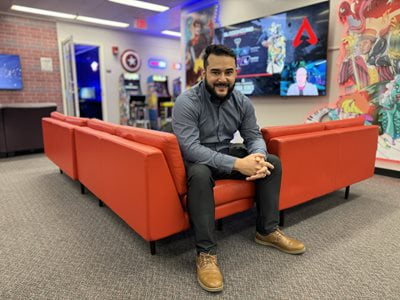Literacies at Play: Digital-Age Literacies in High School Esports
Faculty’s new book chapter challenges traditional notions of gamer culture
 A new publication featuring a faculty member in the College of Education is challenging mainstream ideas of how esports can impact student learning, health, and overall wellbeing.
A new publication featuring a faculty member in the College of Education is challenging mainstream ideas of how esports can impact student learning, health, and overall wellbeing. The book, “The Literacies of the Esports Ecosystem,” includes a first chapter written by Dr. Luis Pérez Cortés, an assistant professor. The chapter highlights Pérez Cortés’ research into high school gaming between 2020 and 2021 – near the height of the pandemic when video game sales and gaming were near all-time highs – and digital-age literacies, a notion that contemporary literacy practices are hybrid and exist in the physical as well as the digital worlds.
“I was a volunteer esports coach preparing to embed myself into two high school clubs,” said Pérez Cortés. “There were about 20 students in each club, and I worked closely with eight focal participants, including three teachers, for this study. They often played games like ‘League of Legends,’ ‘Call of Duty,’ ‘Rocket League,’ and ‘Rainbow Six Siege.’”
The pandemic pulled the cord on nearly all school activities and clubs. However, the game wasn’t over for the esports clubs, which took place primarily online.
“I started to observe that the teens were working with each other and with the technology in really unique ways that included interactions on their screens by playing the games, beneath their screens by understanding the programming of their games, and around their screens by interacting with each other outside the games,” he added.
Among the benefits, students were developing critical thinking skills.
In one example, a teacher was speaking with a group of high schoolers about a major esports tournament that was being sponsored by the U.S. miliary. The teacher asked the students to consider the potential reasoning and benefits for the military. While soldier recruitment seemed obvious, the students also considered that the military might have a greater call: tapping into gamer skills – such as how to be decisive, pay attention to detail, and think laterally in time-sensitive spaces. The students also noticed that the miliary advertised in old-school video game magazines since at least the 1990s – possibly an indication of a military effort to stream into the benefits of gaming.
 “It’s really interesting shift in how people think about what it means to be a gamer,” said Pérez Cortés.
“It’s really interesting shift in how people think about what it means to be a gamer,” said Pérez Cortés. “For a long time, gamer culture was this basement thing you did when you had nothing better to do,” he continued. “Now with the boom of clubs and leagues over the past 15 years, that’s changing. There is a growing perception that gaming has great value-adds.”
It was a full circle moment.
“Growing up, gaming was by far my favorite personal hobby,” said Pérez Cortés, who grew up in Puerto Rico playing games that had a lot of complex English-language interactions such as “Pokémon,” “Metal Gear,” and “Mass Effect.” “Spanish is my first language. I didn’t think about how well I picked up English until a college professor in Puerto Rico asked me how I was able to speak the language so well. The best answer I could come up with was all the games I played in English. That was the first time I began looking at how games might be good for learning.’”
Among the study’s other findings, the clubs created a safe space where high schoolers felt they belonged and could interact in a community – improving their socialization skills and mental health and teaching the teens how to manage teams and organize events.
“They were learning mechanisms for success in school and at work that had never been communicated,” he continued. “Schools are doing these activities with real-world learning and benefits just below the surface. There is a lot of interest from young people and educators, but there aren’t enough people looking at how esports can truly be a productive learning opportunity and use of time in school settings. The goal with this book chapter is to be part of that change.”